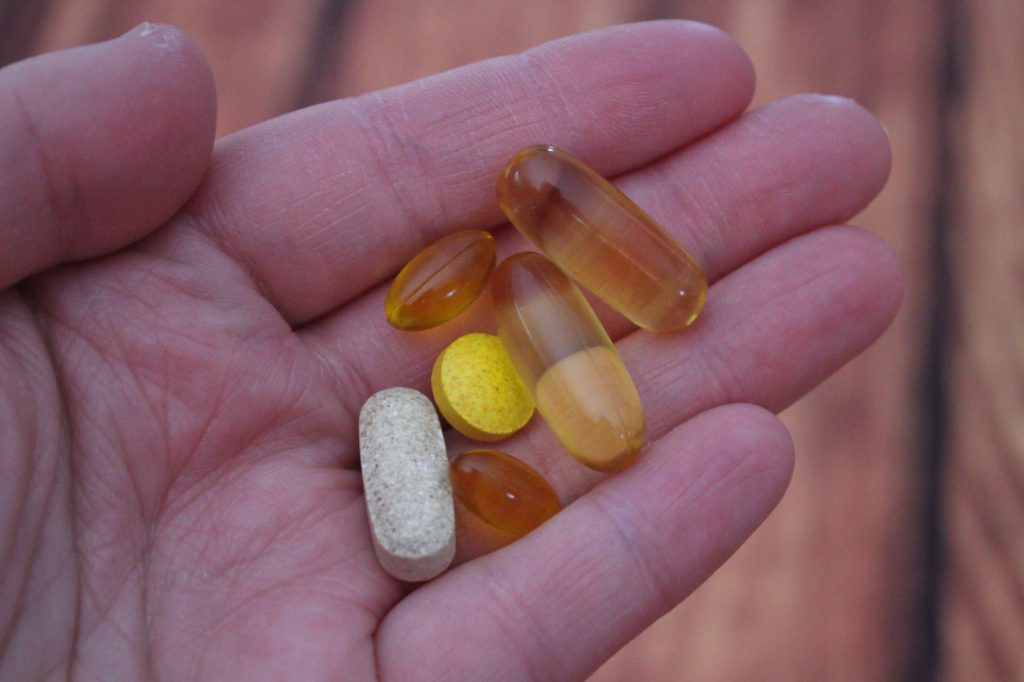
Difference Between Vitamins And Supplements
LAST UPDATED: November 10, 2022
Adding vitamins and supplements into your diet is a way to boost health and get the nutrients you may be lacking.
Are you confused about vitamins and supplements? Wondering what the actual difference is? Well, you’re not alone!
Here’s what you need to know about vitamins and supplements, how they’re different, how they can work together, and why you should consider DNA testing to get the right supplements for your unique needs.

What are Vitamins?
You may have heard that you should take your vitamins, but what are they, really? And why do you need to take them anyway?
Vitamins are essential organic compounds that humans need to survive. Yes—that’s right, vitamins are one of the only micronutrients that humans need to consume. Without them, our body starts to break down.
You usually consume vitamins in really small quantities. And, actually, there are only 13 vitamins known to humans:
- Vitamin A
- Vitamin C
- Vitamin D
- Vitamin E
- Vitamin K
And then the B vitamins:
- Thiamine
- Riboflavin
- Niacin
- Pantothenic acid
- Biotin
- Vitamin B6
- Vitamin B12
- Folate
Vitamins are considered essential largely because humans cannot produce them. So you should be getting it in through your diet or supplementation. If you’re unsure about the types of vitamins that your body craves, then you could consider DNA testing with Autumn DNA to make sure that your body is getting all its essentials.
Vitamins can help with immune function, blood flow, muscle growth, and digestion, among a number of other things!

What are Supplements?
Supplements are different from vitamins because they can also be things other than vitamins.
Some possible supplements you can take may include vitamins, minerals, nutrients, and herbal products known as botanicals in the ingredient list.
Vitamins can be supplements, but not all supplements are vitamins. “Supplement” is a broader umbrella term for something you’re consuming in addition to the food you eat.
Supplements are distinctly different from prescription pills. You can usually buy them OTC (over the counter) at a health foods store, at the grocery store, or at a local pharmacy. And, like vitamins, you can get them in pill form, powder form, and sometimes even liquid form!
You can think of supplements as a product that augments your health and adds nutritional value to your diet. And vitamins are merely a type of supplement (not the other way around). Sometimes supplements are required in one’s diet, but this will most likely depend on a person’s unique genetic code.
Examples of supplements that aren’t the 13 core vitamins include:
- Fish oil
- Calcium
- Fiber
- Amino Acids
- Enzymes
Unlike vitamins, all humans don’t need supplements to survive. Instead, they’re useful for improving health and in other ways.
Supplements can contain a range of ingredients and have a range of benefits.
Common Misconceptions About Vitamins and Supplements
There are many common misconceptions about vitamins and supplements. Here are 6 misconceptions you should know:

1. Only Taking Multivitamins Can Makeup for a Bad Diet
Many health practitioners can agree that if you take any kind of supplement, you should consider a multivitamin in addition to eating right and exercising.
Some people think that taking a multivitamin can reverse some aspects of a bad diet, but this has not been proven to be true.
While taking a multivitamin can be beneficial, it should be done with other lifestyle changes—like drinking agua and movin’ that body!
2. All Supplements Are Natural and Safe
Because the bottle says it’s natural and organic, many people start taking vitamins and supplements thinking that they’re automatically safe.
Not everything that is natural is safe!
Many natural products can also be silent killers. Things like arsenic, poisonous mushrooms, deadly nightshade, water hemlock, and the stem of rhubarb are natural but are also poisonous and can seriously harm you!
And just because it’s labelled as “all natural” doesn’t mean that is true!
“All natural” labelling standards suggest that no processing is involved. This isn’t possible! So be wary of these labels!
3. You Can’t Overdose on Vitamins
One major myth that exists about vitamins and supplements is that you can’t overdose. The health industry promotes the idea that you can take as many vitamins as you want, and all that will happen is that you pee out the rest.
This is simply untrue, and one of the dangers of self-prescribing supplements!
Unfortunately, taking too many vitamins and supplements can impact you negatively, especially if the vitamins aren’t regulated, and additional ingredients sneak in.
Vitamin C, for example, which has numerous health benefits, can affect you negatively when taken in excess, experiencing diarrhea and gastrointestinal discomfort. And too many other vitamins can lead to vital organ damage, nerve damage, and birth defects in pregnant women.
4. Supplements are Regulated by the FDA
Unlike OTCs, supplements are in the wild west of regulation. The Food and Drug Administration (FDA) in the United States does not have to control supplement brands or require testing to ensure that the supplements are safe for use.
What the FDA and FTC do is monitor the label information once the supplements on the market. This is to make sure that the brand is not printing misleading information. However, a lot of damage can happen before the FDA and FTC get involved.
5. Supplements Aren’t Necessary
Not all supplements are necessary (like vitamins) and not everyone has to take a supplement for nutritional deficiencies.
However, there are cases when a supplement is needed:
- Someone who has a nutritional deficiency
- Someone who is on a restricted caloric diet
- Someone allergic to certain foods
- A pregnant woman
- A vegan may be lacking certain vitamins
- For older adults
Your unique genetic code may also be a reason why someone would take supplements. Submitting a DNA kit to test for supplement recommendations can show us how some of our nutritional or health blocks may actually be related to our genetics!
6. Supplements Don’t Interact With Prescription Medications
Some supplements interact with prescription meds.
Vitamin K, zinc, and omega-3 supplements may interact with medications. Additionally, the effects of aspirin or a bacterial antibiotic could be enhanced by certain supplements.

Are Vitamins and Supplements Right for You?
Vitamins and supplements are available to boost our health and supplement our diet. However, careful considerations need to be made when taking either of them.
Read the label and read up on supplemental interactions so that you know that you’re safe.
Always shop from a reliable supplement brand so that you know exactly what you’re putting into your body.
Self-prescribing supplements could be potentially dangerous. They may interact with your medications. Or, they may not even be something you need, causing you to waste your hard-earned money.
If you’re uncertain about whether or not supplementation is right for you, talk to your doctor.
